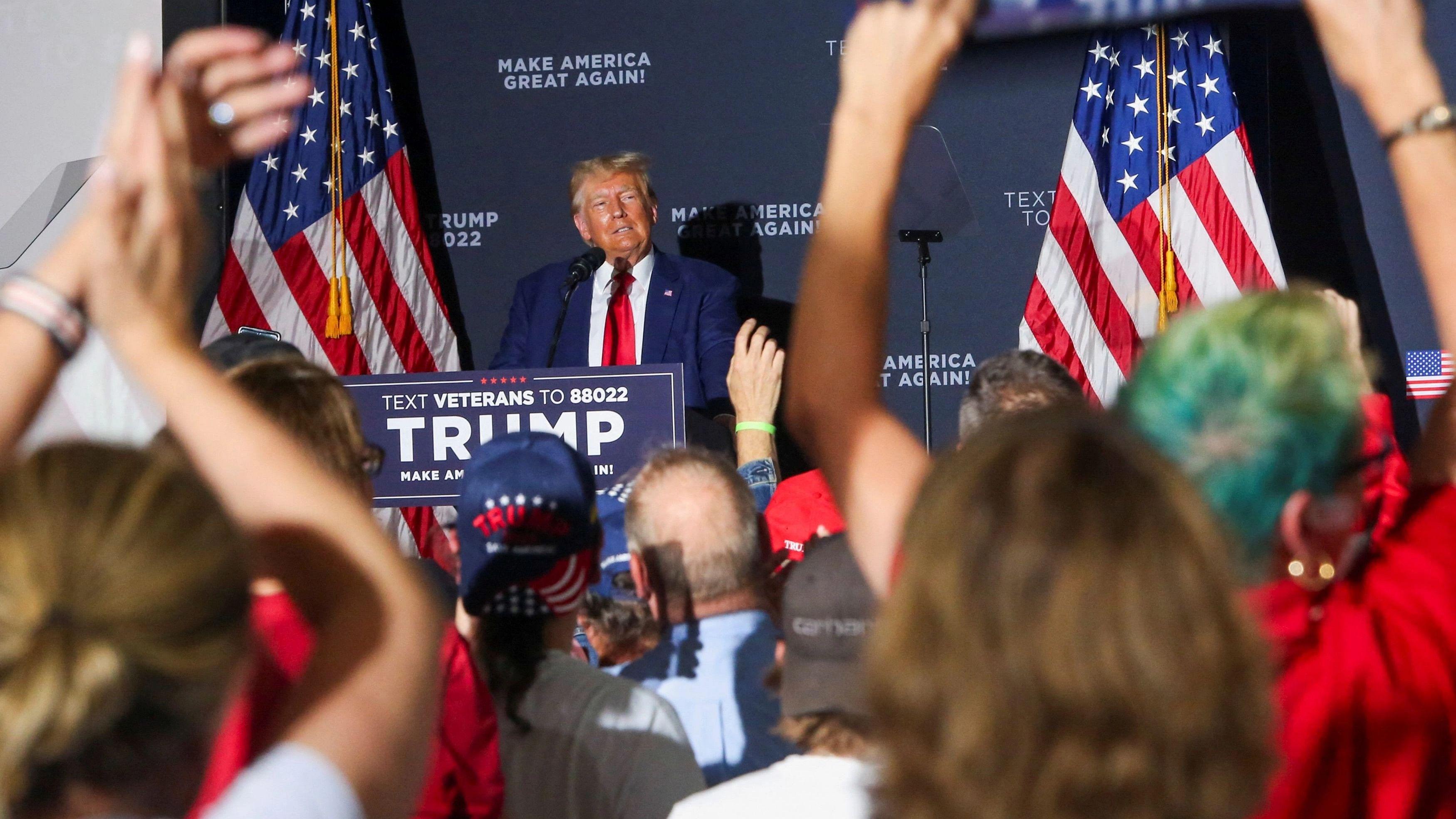
Former US President and Republican presidential candidate Donald Trump speaks during a campaign rally in Windham, New Hampshire, US.
Credit: Reuters Photo
The first in a series of the Republican Party’s debates to choose its nominee for the United States of America’s presidency will take place amidst wild excitement on August 23 in Milwaukee, in Wisconsin.
It may set the stage for the most uncharted and emotive primary season for any party in US history. The active primary season usually stretches until the middle of a presidential year — 2024 this time. The season can be in the realm of uncertainty even up to August if none of the aspirants manage to garner enough delegates for a party’s national convention, which elects the candidate.
The 2024 primaries will be unprecedented for the Republicans because the party’s current frontrunner, Donald Trump, may be forced to take part in the later debates, and in some of the final primaries wearing a criminal’s ankle bracelet ordered by a judge, if the profusion of indictments against him take their course in courtrooms in several US states.
In the event Trump is elected President — although unlikely, according to the present state of play — he may well be sworn into the highest office of that land from a jail cell. Once he is sworn in, he can, of course, pardon himself using his unfettered authority for issuing pardons as US President, and get out of jail. It is the subject of an ongoing legal debate whether he can claim immunity from his jail terms or other punishments as US President without a formal pardon.
The presidential debates that are about to commence will have rare precedents for another reason. Such debates are usually dominated by domestic issues and the economy. Not since the end of the Vietnam war half a century ago has foreign policy figured in any big way in a presidential debate of either party. Occasionally, because of insistence by moderators for reasons of their personal interest in the subject, foreign policy is injected into one segment of a debate. It usually begets yawns from most viewers who are so inward-oriented that they do not consider foreign affairs to be a national election issue. For a change, on August 23, no debate viewer can run away from the issue of the war in Ukraine.
To influence the millions of prime-time television viewers of the debate, advertisements worth $2 million will be aired solely on the need for continued and vigorous US support for Ukraine during its two-hour duration. It will not be lost on anyone that inside the debate hall, however, contestants will be sparring over where they want to take the US on other issues in four years if they occupy the White House 17 months from now.
Opinion polls uniformly show that public support among voters for the seemingly endless US funding of Ukraine’s war effort is waning. Such a feeling is stronger — more than 70 per cent of respondents — among likely Republican voters. They are asking why the money spent on Ukraine’s defence — $43 billion so far — should not have been spent on improving schools, hospitals, and infrastructure within the US. This is a big decline in support of Kyiv from February 2022 when Russia launched its military operation against its neighbour. That is why supporters of Ukraine have put together a campaign blitz to shore up support against Russia’s invasion of Ukraine.
In the last one month, supporters of Ukraine were booed and shouted down at two important conservative national conferences attended by Republican candidate hopefuls. Among those unceremoniously heckled was former Vice-President Mike Pence, who tried arguing Kyiv’s case. Clearly, the Republican base is at odds with the national mood in the US, which is still broadly favourable towards Ukraine’s war efforts.
So, there is no immediate danger that the tap of massive and continuing funding for Kyiv will be turned off. But that cannot be guaranteed if voters elect a Republican Congress in November 2024. For frontrunner Trump, Ukraine is a Joe Biden family issue. It is typical of his unconventional stand on many things. As President, Trump pressured Ukraine President Volodymyr Zelenskyy to order an investigation into the business dealings of the incumbent President’s son Hunter Biden with Ukrainian conglomerates. Trump wants all aid to Kyiv to be frozen until Hunter Biden’s alleged corruption is investigated free of political interference.
Meanwhile, at the time of writing, it is not clear if Trump will attend the August 23 debate. That is his way of keeping the Grand Old Party on edge.
(KP Nayar has extensively covered West Asia and reported from Washington as a foreign correspondent for 15 years)
Disclaimer: The views expressed above are the author's own. They do not necessarily reflect the views of DH.